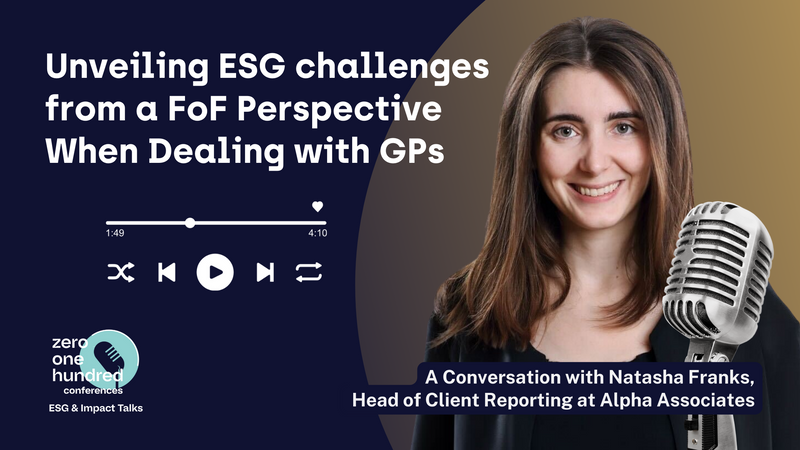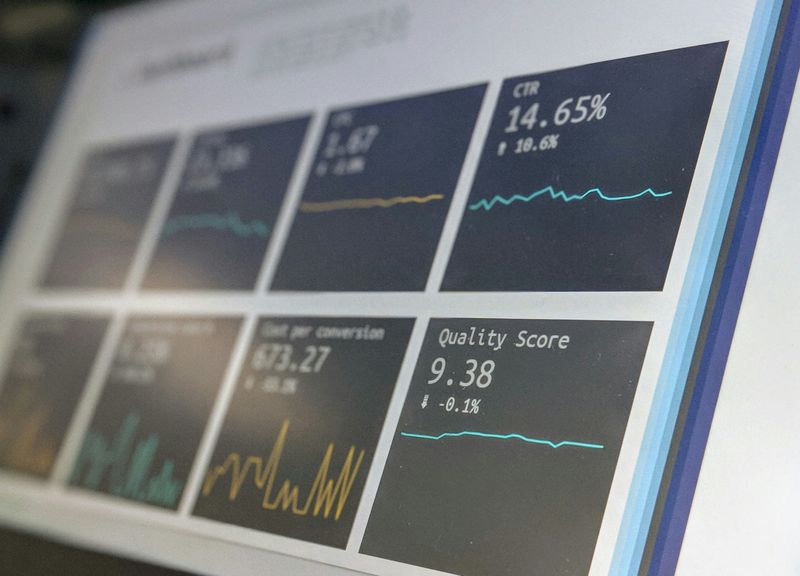Embark on a journey into the realm of ESG reporting and impact investments with Natasha Franks, Head of Client Reporting at Alpha Associates, in our latest episode of Zero One Hundred ESG & Impact Talks. Alpha Associates, a Zurich-based independent manager recently acquired by Amundi, takes center stage as Natasha unveils the nuances of managing ESG reporting within a fund of funds. Dive deep into the discussion as she sheds light on Alpha's commitment to sustainability, including the launch of their first impact fund of funds. Natasha oversees the reporting process for Alpha's private equity, private debt, and infrastructure products. Learn about her journey and expertise, from earning a B.A. in English Literature at the University of St Andrews, Scotland, to obtaining a master's in economics & finance from Birkbeck, University of London. Tune in to gain insights into the evolving landscape of ESG and impact investments in the private markets.
Listen to the full episode here.

How relevant is ESG reporting for the fund managers that you have to deal with every day, and how committed are they?
I think it's extremely relevant nowadays, more so for our European fund managers because we have a multi-asset portfolio and it's very diversified, not just across asset class, but also then across geography. So, we found that over the past, even just two to three years, ESG reporting has become a priority for European managers and then less so for American managers, although I think they're beginning to catch up a little bit.
So there's a different level of commitment?
Yes, very much so. I think that European managers are more motivated, honestly by the law, because I think that before we had these regulations and more restrictions on how a manager can invest, it didn't seem to be very much front of thought for them. I think that it was viewed as a nice to have and not a must-have, but now in Europe, it's viewed as a must-have, whereas in the US, not just the impact environment, but the whole mindset towards ESG is still relatively immature, and highly politicized. So I think it's not viewed as something that must be integrated, but it's still viewed as like an add-on.
And maybe sometimes not even an add-on...
Yeah. In some cases, it can almost be like a deterrent, especially because of how politicized it has become. Saying you're an ESG-friendly manager, can mean something completely different in the US, depending on who you're speaking to, as in, it can mean you're conservative or you're liberal or you hold certain views when it really should be agnostic to that. However, we found that ESG can be the opposite of a selling point to Americans because they still don't quite associate it as this associated with this independent structure. They still view it as integrated into politics.

As you were saying you have this multi-asset, also multi-geographical presence. Where is the most difficult to collect data within the multi-asset portfolio, like, not only geographically, but also in terms of assets?
We find that when it comes to asset class, our private debt and private credit managers tend to struggle the most with data collection. And that's unfortunately just part of the nature of the asset class, where if you're a controlling private equity investor, for example, you might have a board seat on the companies that you invest in, and you will have access to more information and have more of an influence on how the company is run, whereas a private debt manager might not have any of that information. So I think that we're seeing some evolution in the private debt space. For example, when they do provide debt to companies, they are asking these questions regarding ESG and the company's development plan, but we still see quite a big drop off compared to the amount of data they're able to collect versus what, say, an infrastructure investor or private equity investor could collect for us.
And I remember that previously you mentioned also that it's not easy to deal with data collection when it comes to venture capital funds in the US as well.
Yes. Regarding private debt, the issue is getting the data. Regarding the venture, often the issue is that many of the very specific ESG, or impact data points that we request don't necessarily apply to them. For example, from a governance perspective, you want to know: does this company have a health and safety policy? Well, maybe it's a venture startup that only has two employees, so that's not even something that's on their minds. And on top of that, the venture space, I think late-stage venture is getting there. But the early-stage venture, it's almost like that's sort of the last thing on their mind. And if you combine that with being in the US, which already has difficulties regarding ESG, it's like the perfect combination to not get very much ESG data.

Do you see a difference between early-stage ventures here in Europe?
I think that in Europe there is now this mindset that you need good ESG practices to future-proof your company. So again, to use the same example, maybe you don't need a health and safety policy right now, but you will need it in three, or four years when your company grows. So, I think in Europe they pay a little more attention to that, to setting that ESG foundation. And I think in the US they're moving in that direction, but without the regulatory and legal motivation, they aren't really as encouraged to make it a priority.
That's something that happens in general. Right. If there's no legal need, then we just don't move towards that.
Yeah, exactly. Then it's just viewed as an extra resource that will be taken up or an extra expense, which is unfortunate because ultimately strong ESG practices should only help a company in the long run and help it grow and future-proof it and give it these robust internal mechanisms which in the long run will lead to higher returns.
Sometimes it's really hard to understand that we are very used to the short term more than the long term in general, especially, I think, in this industry where you have to deliver results as well.
Yes, I think people tend to look at things on a quarter-by-quarter basis. Every quarter you want to see things going up. And it's not as bad as in the public markets, where people don't even look quarter by quarter. They look hour by hour to see how the stock price is changing. So that's a benefit of the private markets is that you can look at least a little longer term. And I think that's something that people are beginning to see now because they're seeing that funds and managers that have incorporated ESG and impact into their strategies already are being shown to benefit more in this environment. Funds that were already very strong in terms of ESG can, for example, become SFDR article eight quite easily without having to really change anything. But other funds that don't have those strategies in place might struggle a little bit more.
With all the funds that you manage, how do you see the level of not maturity, like in general, when it comes to the data that they give you, the quality, how do you see that? Also, how do you standardize all that information?
So in terms of the quality of data, I think just in the past couple of years we've seen a huge shift, a huge positive shift. Just when we started our ESG reporting campaign three years ago, we got some data, but we can't attest to the quality of it because it's self-reported. And more importantly, it was just data that existed in a vacuum. We had no prior years to compare it to. There weren't any industry benchmarks. We couldn't really do anything with it. So, it was very immature on both sides. Now, it's been a few years, and we find that the data is not quite there yet, but it's getting better. So, we're able to now compare performance year on year, and we're able to see trends and we're able to certainly receive more data. In our past year's ESG campaign, we had a 100% response rate from our private debt and infrastructure managers. So even if they couldn't give us all of the data, they at least filled out the entire questionnaire to the best of their ability.

Can you tell us a little bit about the ESG reporting campaign? Because you said three years ago it was completely different to what it is right now, how hard is it?
Something that we found is almost like a blessing and a curse is how many regulations there are now and how quickly those regulations are changing. So when we started our campaign, which is essentially a fairly detailed questionnaire that we send to our fund managers, and they complete that on a manager level and then on a fund level for each of their underlying funds. And when we first developed it, we were able to look at regulations. We looked at what the UN was saying, at what the European Commission was writing, and we incorporated that into our questionnaire because we hoped that we could request data that ideally people already had. If it's a requirement that everyone needs to track their scope one and scope two emissions, then that's what we would ask for, and hopefully, it would not be too much of a burden. However, every year things change. Every year we have different metrics that we're being advised to include. We have different types of data analysis frameworks that have become the industry standards now we have scope four emissions, for example, which wasn't even a thing a few years ago. So, we're trying to keep up. Each year, ideally, we hope that our questionnaire gets better and better as the industry itself matures. And when we receive the data, we hope that we're able to interpret it with a little more nuance compared to, say, where the industry was three years ago.
Another difficulty that we have because we manage a multi-asset portfolio, is finding the ideal framework to benchmark our managers without punishing them for the nature of their asset class. So, for example, it's difficult to compare the ESG performance of a private debt manager with that of an infrastructure manager. In the same way, you couldn't compare the returns of each one because there are so many external factors that influence those portfolios. So, to address that, we need to use a lot of in-house developed data analysis tools and our internal framework to look at, again, say, a private equity manager's performance. And we think, okay, well, we ask them this question regarding how they manage their underlying investments from an ESG perspective, but that wouldn't apply to a private debt manager. So, we really shouldn't penalize them. We shouldn't take away points from them just because of that. So we will exclude that from them. And then the same methodology would apply to an infrastructure manager. We go through all of the questions that we asked, and we rule out the ones that they truly would not have any way of answering, no matter how great they were at ESG. So that's a way that we try and tailor our ESG approach to every manager in our portfolio to be as fair as possible to all of them.
And you do that with some specific software?
Yes. To collect the data itself and to make the survey, we use a software called Reporting 21, which is used fairly widely in the private markets as an ESG data collection tool. So that's made things very easy in terms of getting the data from our managers. They receive so many excel spreadsheets. I think this way they can log into this platform, answer our questionnaire, and then we receive the data. Then to analyze the data, that's where we need to take things in-house. And we use a combination of our existing portfolio management software, as well as some algorithms that were written specifically to analyze the ESG metrics that we receive. And then we produce in what we hope is a very nice, visually appealing report with all the key data points presented.

Alpha's impact fund of funds
This is with regards to ESG data collection. But on the other side, Alpha is also doing impact. What's Alpha doing about impact right now?
So we're quite happy that we've been able to incorporate impact not just into our impact fund of funds, which we're currently fundraising for, but also into our other products. For example, we have two SFDR article eight infrastructure fund of funds as well. And in our private debt manager selection process, we also incorporate impact-related metrics whenever conducting any kind of due diligence on a manager or a fund. So, we try to incorporate impact into every fund on some level. Our impact fund of funds, however, is our dedicated impact fund. So that's private equity. It's SFDR article nine, and it will invest exclusively in managers and funds that are either SFDR article nine or equivalent. So that sort of helps us be a little more geographically diversified than a fund that could only invest in, say, SFDR article nine funds, which would restrict you heavily to European funds, because that's not something that you see as much in the US.
And what do you expect in terms of investments? Where do you think will be the focus geographically? Because you're saying not only Europe but also the rest of the world, and also in terms of sector, where do you think you'll be targeting?
We find that climate is probably in the greatest demand right now. I think that's because it's arguably the easiest, as in you can invest in renewables, everyone can invest in wind farms. It's the type of fund that we see launching the most climate change-related impact funds. So that's certainly going to be a big theme for us. However, we are also looking at social impact-related funds. So, for example, a fund that might focus on investing in online education companies. We also want to look at things on the governance side as well. So, say investing in startups that offer tools to businesses. Say like an online HR tool that can help a small startup implement robust governance practices. We also want to focus on financial inclusion, so say investing in startup banks or funds that focus on alleviating poverty and improving society, not just on a macro-environmental level, but also really from the bottom up and impacting everyday people's lives.
And geographically speaking….
A mixture of Europe and North America and then some smaller exposure to the rest of the world likely, say Australia. The emerging markets are quite difficult regarding data collection. So that's one of the reasons why I think for us and many other managers in Europe, it's a bit easier to focus on investments in Europe and North America because let's say you need the carbon emissions of a wind farmer. In mean, that's just in terms of actually quantifying that data and receiving it. Sometimes it feels impossible, which is unfortunate. But this is one of the reasons that I believe the whole SFDR classification system is being reviewed right now by the European Commission because having such strict data collection requirements also has the unfortunate effect of restricting the markets and companies that a fund can invest in. So even if you could have a positive impact by investing more in emerging markets, that disconnect regarding the data collection then means that perhaps you couldn't be SFDR article nine.
And where do you think is the balance? Because in the end, we are kind of heading toward segmentation. Again, you can only invest in places where you can collect the data, and the places where you can collect the data are the places that are more evolved.
Developed markets just lean on others. I think that a reason for that is also a bit of the misinterpretation of how SFDR is intended to function. And I think this is quite a hot topic in the industry right now. People look at SFDR articles eight and nine as a gold star, like we must invest in funds that are eight or nine, because those must be funds with the best ESG practices. But actually, all these classifications are is a sign of what data you're able to collect, which isn't automatically a good thing. You might be able to collect data regarding gender metrics from every one of your companies, but perhaps all of those metrics show that there is 0% female board representation. It doesn't necessarily mean that it's an ESG-friendly investment, but it means that they're providing the data. I think, in general, there can be some more clarity on what exactly SFDR means. If people can interpret it correctly, there will be less of a stigma associated with not being SFDR article eight or nine, which I think would also make fund managers a little more open to not restricting themselves so much to these classifications.
Who's responsible? Who should make that clearer?
I think it's a mixture of. Ultimately, it comes from the top. At the end of the day, although I think it's a mixture of the industry, the media, and the regulatory bodies, it's like everyone has some role to play in how we implement and interpret these classifications. I think ultimately, the European Commission is trying to find a way to resolve this because these are their classifications, and if they're being misused, it comes down to the regulator to ensure that they're being used as intended. So perhaps in the next few years, we might not even have SFDR, or we will have it in a very different way than what it is now because I think there is demand in the market to have some kind of label that indicates how ESG-friendly a fund is. So perhaps this will be developed. So instead of article eight or nine, you'll have, is this fund classified as number one, number two, three, etc. However, that would require a much more complicated understanding of how a fund's ESG performance can be benchmarked and assessed. So, it would require not just looking at the data or collecting the data, which is what SFDR does, but also then interpreting that data and saying, is this good? Is this bad? Is this in the middle of the road? And ultimately answering the question of what makes an ESG positive fund.
So it's like SFDR, it's only halfway, and then we have to also go for the other half, which is to see what to do with that information. And I really think that that's the regulator's responsibility.
Yes. And I think that's something that right now, the whole impact and ESG landscape is really missing is some kind of really authoritative governing figure to look towards. If we want to see what interest rates are. Obviously, you go to the Central Bank for this. We have laws in place for most financial metrics, but we don't quite have that exact equivalent for impact and ESG. So right now, I think the regulators are also struggling. Where do they find the experts? Where do they find people who can really sit down and say, this is how ESG should be handled, or this is what impact investing is? I think they're putting quite a lot of effort into that and they're investing in that. So, it's going to be a very slow process, which makes things difficult as an investor, but I think it's moving in the right direction.
Yeah, I guess we're going to get there at some point, hopefully…
Exactly. With financial reporting, it's relatively easy. It takes a lot of work, but it's easy in that you've got know, you've got GAAP you have very clear best practices, you have auditors. If you produce a financial report, it's quite clear what is expected of you and how you will measure your performance. But with ESG reporting, everyone can do whatever they want. It's essentially viewed as a marketing tool. People can just fill it with pictures. They can cherry-pick the best metrics. There's nothing that regulates that or guides that. An ESG report is effectively whatever you want it to be. And that might not always be a good thing because it makes it very difficult to view them as anything but marketing material. If there's nothing that obligates a manager to disclose information that might not put their ESG practices in the best light, then it essentially is just a way of showing off the things you do well, which is not always the most accurate, holistic depiction of what your ESG capabilities are.
Good things to show that is nothing compared to all the things that you do. But yeah, let's hope for this to get better in the future. But at least we're talking about it, right? Actually, the reason why we're launching this podcast is to talk about it a little more and put the topic on the table with experts who have to deal with it every day. Like you, Natasha.
I just wanted to ask you one last question that is about Alpha's new impact funds. The company has been doing private equity for many years, right? What do you think is the most challenging issue when it comes to impact private equity from Alpha's perspective?
In our case, we've been investing in private equity for just over 20 years now. And I think that we're very lucky because for the past 1819 years, so very shortly after our inception, we already started implementing ESG standards into our portfolio. After all, one of our initial cornerstone investors was the European Bank of Reconstruction and Development, and they already had very strict disclosure requirements regarding ESG and what they could invest in and what data we had to collect. So in a way, we had a bit of a head start, because from the beginning, we have always had to have ESG in the backs of our minds whenever making any kind of investments. So now, after 20 years, we've reached a point where we feel ready to launch. Now, this dedicated impact fund, however, a benefit is that it's not so different from the funds that we already invest in and the funds that we already manage, because essentially, it's just what we do already, but on a slightly more accountable level, as in with the SFDR classification, now the difficulty comes down to resources. So we know that this is already something that we're doing.
We already have these processes in place, but now we also need to take the time to collate everything into a centralized template send it to the regulator, and make sure that we're constantly monitoring it. So that's been a learning process of how to formalize the systems that we already had in place. Ultimately, I think it's all for the better because it has allowed us to also refine our existing ESG processes and formalize them for our impact fund of funds.
And do you think in the future it will gain more protagonism? Because you said the other funds that you've been dealing with in the past, they all have ESG integrated somehow, but now you're doing it from the beginning. No, it's not new, but you're doing it from the beginning. And do you think that this would be kind of like a new way to do things?
I think so. I mean, my view is that in the very long run, although hopefully not too far in the future, in a way, every fund will need to be an impact fund. I think that it should become the industry norm that every fund needs to make investments that ideally don't harm the planet, but even more ideally, that add some level of benefits, whether that's regarding the E the S or the G. So in theory right now, yes, we have all these impact dedicated funds like our impact-dedicated funds. But in theory, every fund should be its version of an impact fund.
Natasha Franks will be speaking at the panel “The Power of Diverse, Inclusive and Engaging Culture in the European PE & VC Ecosystem” at the upcoming 0100 Conference Europe to be held in Amsterdam from April 16th to the 18th, where she will be sharing the stage with Alexander Thees from KfW Capital , Pia Santavirta from Tesi (Finnish Industry Investment Ltd), Nadine Fugert from Adams Street Partners and Helene Schutrumpf from Aurelius.
Register for the conference here.





